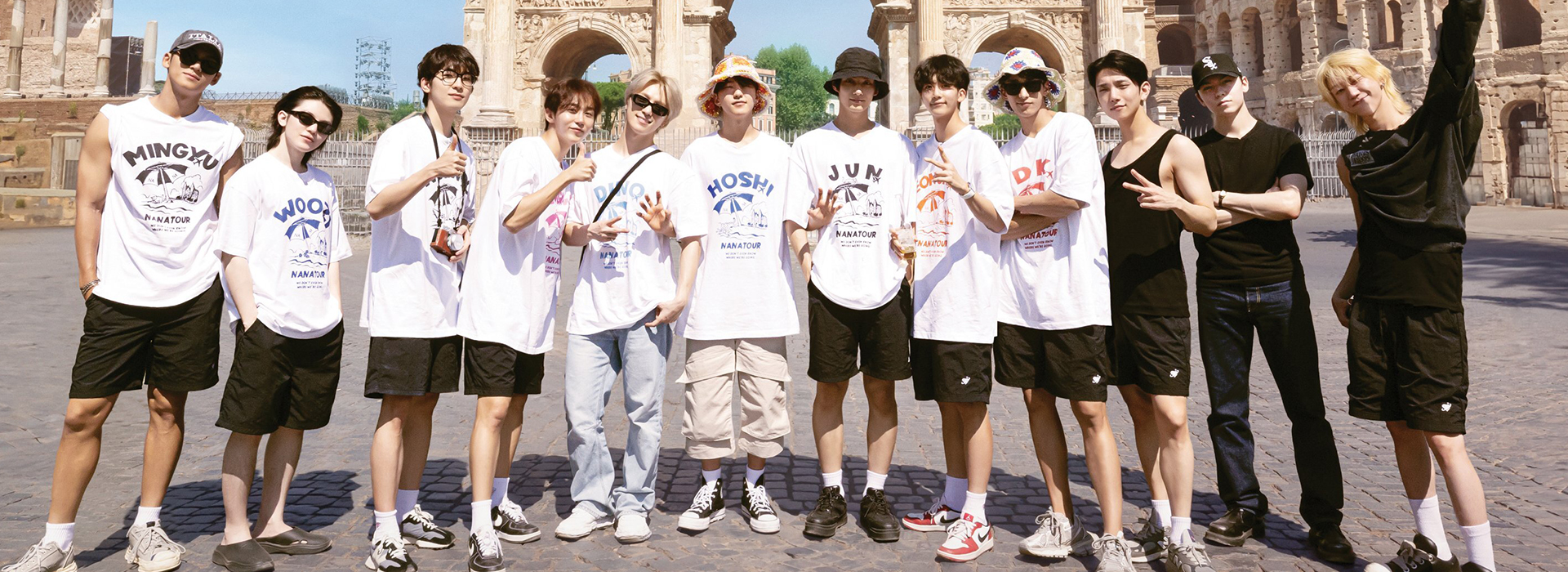
“NANA TOUR with SEVENTEEN” (tvN, Weverse)
Song Hooryeong: “NANA TOUR with SEVENTEEN” can be traced back to last May on “The Game Caterers 2 x SEVENTEEN” when WONWOO and DINO wrote their wish of appearing on “Youth Over Flowers,” which DK ended up drawing. The first episode will finally air tonight at 8:40 PM (KST) on tvN, and the 120-minute full version will be revealed on Weverse later at 10 PM (KST). The show starts off like any other “Youth Over Flowers” episode, where the cast embarks on a trip upon being kidnapped by producer Na Yeong-seok, but minus the exhaustion. It is a package tour full of additional services tailored to SEVENTEEN—a travelog of SEVENTEEN, by SEVENTEEN, for SEVENTEEN. In “NANA TOUR with SEVENTEEN,” Na transforms into “Guide NA” as he taps into his 20 years’ experience of creating group trips and takes SEVENTEEN on a seven-day journey to Italy. The members are thrilled over their sudden trip, which they weren’t expecting at all as they were busy bouncing from one engagement to the next. The first group trip to Europe that they abruptly embarked on after their concert was a holiday of sorts, to these boys who have led the lives of hard-working idols.
As illustrated in the scene where WONWOO suddenly becomes aware of how happy he is simply walking down the street while tasting the local food, “NANA TOUR with SEVENTEEN” captures SEVENTEEN’s shared moments of joy. While nothing much is new or special, the conversations and emotions that the members share are distinctly portrayed in the show. MINGYU’s sadness over the trip coming to an end and having to go back to his everyday life is clearly conveyed when he says, “I want to become Pororo.” DINO’s happiness over traveling with his best buddies is apparent when he toasts, “Here’s to enjoying this moment that won’t ever come again, salute!” They show us the small moments of joy that can be had when traveling with friends when they take a group picture while video chatting with S.COUPS, who is still recovering from his knee surgery back home, and when DINO, the budget manager for the trip, becomes the “man of power.” All moments throughout the trip—both big and small—have become memories that can be revisited from time to time back home, just like how DK greets everyone by merrily saying “Salute!” when the members meet up with the show staff back in Korea after their shoot (“Chattering with the God of Music”). As summed up by the comment—“It’s so much fun when we’re together,”—“NANA TOUR with SEVENTEEN” is a travelog documenting a cheerful group of young people who make mundane moments special and exciting just by being together.


Àma Gloria
Jeong Seohui (Cinema Journalist): Why can’t she love only me? An audience takes their first step. A doctor blows on the palm that was hurt while playing. A chaser keeps a closer watch whether they are in the bathtub or at the sea. Six-year-old Cléo (Louise Mauroy-Panzani) wants her nanny Gloria (Ilça Moreno) all to herself. Director Marie Amachoukeli-Barsacq isn’t ignorant of the fact that Gloria, who came to France all the way from Cape Verde in search of work, is treated as a mother proxy and someone who is subjugated by their salary. An animation insert of a woman braving the stormy seas, as she rows the boat with a single oar under the thundering sky atop the tall, dark waves, is a tribute to us human beings who bore the weight of life with every ounce of our being thus far. The director’s perspective seems to be making a protest of some sort, and has engendered the story of Cléo who knows how to feel affection as it is. Cléo, who is upset over Gloria returning to her island home to attend her mother’s funeral, finally makes it onto the airplane to visit Gloria during her summer break. There on the island, Cléo experiences Gloria’s former life, and witnesses the birth of her grandson Santiago. Cléo feels a strong sense of possessiveness over Gloria—so much so that she would spit in her palm to make a pact if she had to. Gloria is also someone who evokes Cléo’s protective instincts, who makes her whisper while she sleeps lest she wakes Gloria up. However, Gloria’s lullaby that once soothed Cléo to sleep is now sung to keep the more “feeble” Santiago from crying. Cléo dives into the water as if to cool off her burning jealousy. She experiences the dreaded fall of lost love. Can Cléo love only “me” after bidding farewell to an absolute being, who bid that they “stay happy away from each other”? Cléo’s world grows larger as she begins to vaguely understand the co-existence of other forms, as she tries to console her inconsolable sadness.
Unauthorized reproduction and distribution prohibited.